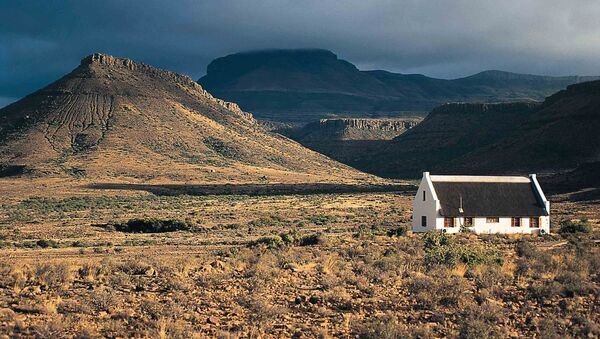Sputnik discussed the latest developments with Ruben Rosiers — a representative of the Afrikaner cultural town of Kleinfontein in the EU.
Sputnik: What has changed in South Africa after the African National Congress came up with the bill on "land expropriation without compensation," what are the most recent developments?
Ruben Rosiers: Well, technically the vote isn't a law yet. We saw that President Cyril Ramaphosa went to the US and that he lied. He said that there are no land grabs. This is a lie, we can prove it. There are thousands of videos, they are proof that there are land grabs. Many radical groups are asking people to occupy the land, so this is a lie. And he also lied because he said that there are no farm murders, while his own minister of police said there should be plan against crime in rural areas, so he's lying. This changed — that he has to lie this big, because he knows of course, that people are telling the truth.
Shocked, no follow up or care about brutal #murders #crime in #SouthAfrica by @realDonaldTrump #kinray @SecPompeo no news on #farmmurders, murder of all our races. White folks brutally tortured and attacked. African Ladies raped in townships #cnn #MSNBC @WhiteHouse
— Bradley Steyn Security Activist (@Tip_o_t_Assegai) October 12, 2018
READ MORE: South African Finance Minister Dishes the Dirt at State Capture Inquiry
Sputnik: We see that tribal aspects are coming into the picture. The Zulu King Goodwill Zwelithini demanded a written guarantee from Cyril Ramaphosa's government last week that Zulus won't be affected by the land reform. What does that mean for the country?
Ruben Rosiers: Well, first of all, it's funny that people are focusing in general on the Afrikaner-owned land and on the Afrikaner villages. If you count Orania and Kleinfontein, we are talking about a few thousand people, while the Zulu King has thousands of times more land under his ownership. What is very important is that all the local tribes should work together, because we have to avoid that the land would be nationalized. This would be the biggest disaster. Zimbabwe would be paradise compared to South Africa. And secondly, we would have to avoid the situation where ANC would steal the land to give it to its own corrupt leadership, or to its own "friends" — that's very important. What is also important is that this agreement between Afriforum and the Zulu King — it would be an example for all the other tribes, that they will join and leave the past behind.
Ruben Rosiers: We can talk about conflicts in the past, but the biggest conflict is now and it's not between the tribes or the groups themselves. The biggest fight now is between people who would like to build a better South Africa and the people who want to keep the status quo, who want to destroy the country, who want to give all the money to their inner circle, who want to steal everything from a very rich country that South Africa still is.
READ MORE: 'South African Economy Has Been on Brink of Recession Past Few Years' — Scholar
It has the possibility to feed all of its people. It has the possibility to be a paradise on Earth, which will not happen if you destroy your economy by "expropriation without compensation," which we saw in every country (which attempted this) around the world. You can't say that Venezuela or North Korea are the best places to invest, and we see the same in South Africa — that it will happen. People are getting nervous because of the elections. The EFF, thanks to the ANC, is getting stronger. I believe it's a bit of silence before the storm, but we'll see.
Sputnik: It doesn't seem that the international community is reacting in any way politically, because South African leaders are visiting big international meetings, they host big international meetings and the land issue is not being brought up before them. Are the EU leaders, and Belgian leaders, in particular, paying attention to this problem or not?
Ruben Rosiers: For the shame of the country they are paying attention, but in a very "sneaky" way. Our own foreign minister went to South Africa and you would have a nice picture in the media like he was there to support women's rights etc, which, of course, is very important, but he's afraid to speak about what he really thinks.
READ MORE: South African Artist's 'Nazi Mandela' Portrait Fuels Tensions Over Land Reform
He's of course, afraid that South Africa would kick the EU out, because, of course, "the East" is standing ready. "The East" is already much stronger in those countries than the EU, because they don't care about human rights, or they don't ask, like we see now in the Balkans. China will not push South Africa to organize "gay pride" while the EU will come and complain about those things. We see that the Belgian foreign minister didn't even mention the topic, that he's not protecting the rights of the many Belgian people, the EU citizens in general in South Africa. He also didn't react when Belgian people, Dutch people or others there got killed, when they are threatened, when there might be "expropriation without compensation" — they didn't really react.
The views and opinions expressed by Ruben Rosiers are those of the speaker and do not necessarily reflect those of Sputnik.


